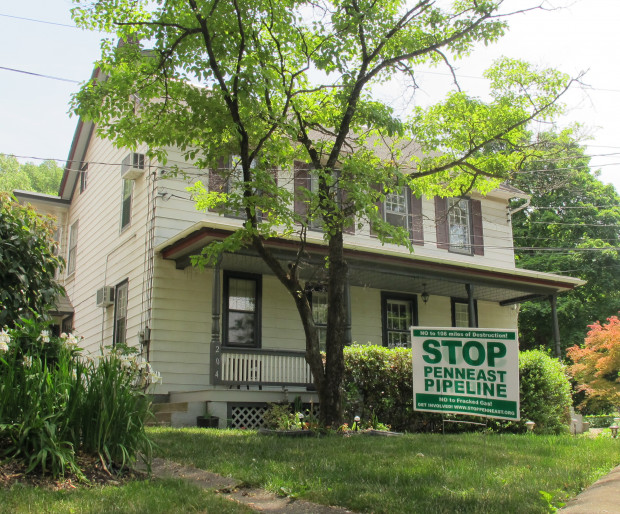NJ blocks PennEast water permit again; company says it will reapply

Susan Phillips / StateImpact Pennsylvania
A sign opposing the PennEast pipeline project on a lawn in Durham Township, Pa. New Jersey DEP has rejected the company's application for water permits.
New Jersey issued its latest rejection of a water-quality permit for the proposed PennEast natural gas pipeline, dealing a new blow to the embattled project.
The state’s Department of Environmental Protection said Wednesday the PennEast Pipeline Co. had failed again to submit all the requested information in its application for the permit, which the department first rejected in April on the same grounds.
Although the company met one of the state’s requirements this time, the rest of the application for a freshwater wetlands permit was still deficient even after a 60-day extension that the DEP provided after the first denial, it said in a letter to the company.
“Given the complexity of the remaining items and the lack of demonstrated progress on the part of the applicant, it appears that it would be unlikely that an additional 60 days would allow substantial progress on the application,” the letter said.
Therefore, the application would be considered “administratively closed” as of Wednesday, the letter said.
In April, the department gave PennEast more time to submit data ranging from tax maps and historic property information to evidence that landowners have given permission to build the line on their properties, and survey data for water crossings. It also said the company had received access to land on less than 35 percent of the New Jersey section of the route.
It also noted then that the company had not received a certificate from the Federal Energy Regulatory Commission that would enable it to use eminent domain to take private land from uncooperative landowners.
The DEP’s latest action further calls into question the future of the pipeline, which would run about 120 miles from Luzerne County, Pa. to Mercer County, NJ. The project has been fiercely opposed by residents along the route in both states, and by environmentalists who argue that it would result in the needless destruction of forests, and would endanger water quality. About two-thirds of the route is in Pennsylvania, where water permits were approved in February.
On Wednesday, opponents welcomed the DEP’s decision.
“This is a victory against the pipeline because they have to start all over again and apply for new permits,” said Jeff Tittel, director of the New Jersey Sierra Club.
Any new application would come close to the time that a new governor will take over after the November election, Tittel said. Democratic nominee Phil Murphy has said he is opposed to the project.
Tom Gilbert, campaign director for the environmental group ReThink Energy NJ, welcomed the DEP’s action, and said the pipeline would cause “irreparable harm” to people along the route.
“NJ DEP repeatedly warned PennEast not to apply for permits before doing all of its legally required homework,” Gilbert said in a statement. “New Jersey doesn’t owe PennEast any special treatment.”
Pat Kornick, a spokeswoman for PennEast, called the DEP decision “not unexpected” and said the company will resubmit its application this year. She said the company is still “on track” to receive final approval from FERC this summer.
Kornick said the number of New Jersey landowners who have given the company permission to survey their land has risen to “approximately 40 percent” and to about 70 percent across the entire route.
FERC has issued a final Environmental Impact Statement for the project, saying it would have minimal impact. The project was given a water-quality permit by the Pennsylvania DEP in February.
But in November last year, New Jersey’s Office of Rate Counsel, an advocate for ratepayers, said PennEast had failed to explain why the pipeline is needed and had not justified its profit projections.
















